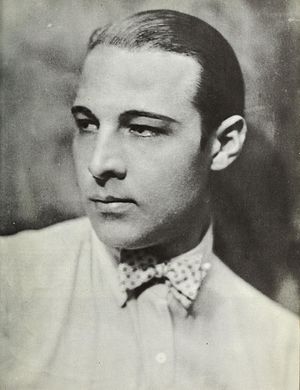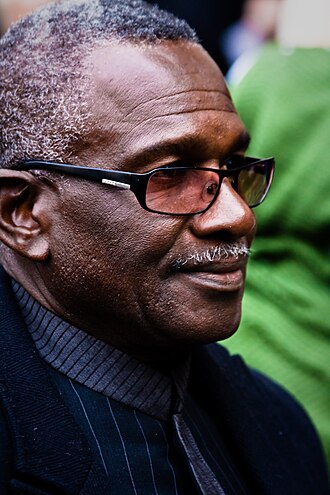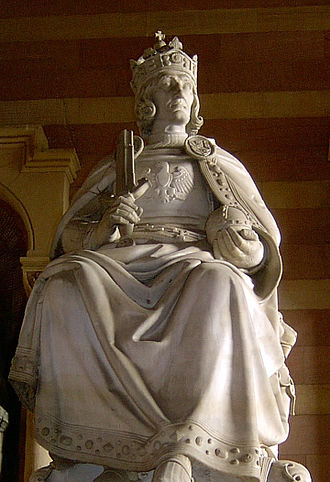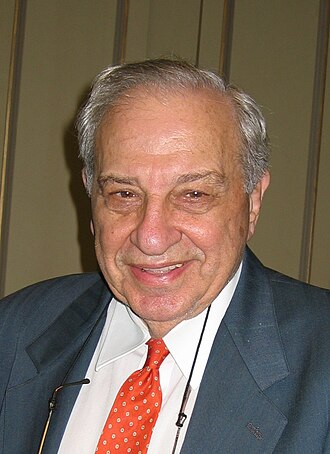Discover Your Roots
SIGN UPDiscover Your Roots
SIGN UPRudolph is a male name of English origin, meaning "Famous Wolf." It has a rich history and has been used by various notable figures throughout time. In religious circles, it has been associated with revered individuals such as Rudolf of Fulda, a 9th-century monk, and Rudolf von Habsburg-Lothringen, an Archbishop. Royalty and nobility have also been linked to the name, including Holy Roman Emperor Rudolf II and Rudolf, Crown Prince of Austria. Additionally, the name has left its mark on geography, with places like Rudolph Glacier in Antarctica and Rudolph, Wisconsin in the United States bearing its name. In popular culture, Rudolph is recognized as the iconic red-nosed reindeer in the classic Christmas tale and has also been associated with fictional characters in various media.

Rudolph Valentino, born Rodolfo Pietro Filiberto Raffaello Guglielmi di Valentina d'Antonguella, was an Italian actor known as the "Latin Lover," who gained fame in the 1920s for his roles in silent films such as "The Four Horsemen of the Apocalypse," "The Sheik," and "The Son of the Sheik." Born in Castellaneta, Italy, Valentino emigrated to the United States in 1913, where he initially struggled to find stable employment. Eventually, he found work as a taxi dancer at Maxim's Restaurant-Cabaret in New York City, and later pursued a career in cinema at the encouragement of actor Norman Kerry. Valentino's rise to stardom was marked by his charming persona and romantic on-screen presence, earning him the title of a sex symbol of the 1920s. Tragically, his untimely death at the age of 31 led to mass hysteria among his fans and solidified his status as a cultural film icon. Despite his short life, Rudolph Valentino's impact on early cinematic history remains significant, and his legacy continues to influence popular culture to this day.

Rudolph Malcolm Walker, born on September 28, 1939, is a Trinidadian-British actor renowned for his versatile roles in television, film, and theater. He gained prominence for portraying Bill Reynolds in "Love Thy Neighbour" and Constable Frank Gladstone in "The Thin Blue Line." However, his most enduring role has been as Patrick Trueman in the long-running BBC soap opera "EastEnders," for which he received the 2018 British Soap Award for Outstanding Achievement. Not limited to screen acting, Walker has made notable contributions to the stage, including performances in Shakespearean plays and contemporary productions. Furthermore, he has ventured into voice acting, notably providing voiceovers for both the British and American versions of "Teletubbies." Off-screen, Walker's commitment to nurturing young talent in the entertainment industry is reflected in The Rudolph Walker Foundation, a charitable initiative aimed at providing opportunities for disadvantaged youths pursuing careers in the arts. His outstanding contributions to the entertainment industry and philanthropic endeavors were recognized with the Commander of the Order of the British Empire (CBE) in 2020. Rudolph Walker's enduring legacy encompasses his artistic prowess, dedication to mentoring emerging talents, and his significant impact on British television and theater.

Rudolph Michael Schindler, born Rudolf Michael Schlesinger, was an Austrian-born American architect known for his innovative works in and around Los Angeles during the early to mid-twentieth century. Often associated with the fringes of the modernist architectural movement, Schindler's use of complex three-dimensional forms, warm materials, and striking colors, as well as his ability to work within tight budgets, have cemented his legacy as one of the mavericks of early twentieth-century architecture. Born on September 10, 1887, in Vienna, Austria, to a middle-class Jewish family, Schindler studied architecture at the Vienna Academy of Fine Arts and was influenced by renowned professors such as Carl König and Adolf Loos. His introduction to the work of Frank Lloyd Wright in 1911 proved to be a pivotal moment in his career. Schindler's professional journey led him to Chicago, where he eventually established contact with Wright and later moved to Los Angeles to work on significant projects such as the iconic Kings Road House. Despite his contributions and achievements, Schindler faced challenges in his relationship with Wright and encountered professional struggles. His lasting impact on architecture is evident in his diverse body of work, showcasing his unique approach and enduring creativity.

Rudolph, also known as Rudolf, is a male first name with a rich historical and cultural significance. The name is derived from ancient Germanic roots, combining elements that signify "fame", "glory", "honour", and "renown" with "wolf". This name has transcended geographical boundaries and is present in various languages, such as French, Italian, Spanish, Dutch, Greek, Hebrew, Japanese, and more. Throughout history, individuals bearing the name Rudolph have made significant contributions in various fields. From royalty and nobility to religious figures, wartime figures, and military leaders, the name Rudolph has been associated with notable personalities. Notable figures include Rudolph II, Holy Roman Emperor, Rudolf I of Germany, Archbishop Rudolf von Habsburg-Lothringen, and military leaders like Rudolph B. Davila and Rudolf von Slatin, among others. The name Rudolph has left an indelible mark on history, evoking a sense of prestige and influence across different cultures and eras.

Rudolph Arthur Marcus, born on July 21, 1923, is a prominent Canadian-born American chemist renowned for receiving the 1992 Nobel Prize in Chemistry for his remarkable contributions to the theory of electron transfer reactions in chemical systems. As a distinguished professor at institutions like Caltech and Nanyang Technological University, Singapore, Marcus has left an indelible mark on the field of chemistry.Marcus's theory, which bears his name, offers a comprehensive thermodynamic and kinetic framework for describing one electron outer-sphere electron transfer. His groundbreaking research in this area has significantly advanced the understanding of fundamental chemical processes. Throughout his illustrious career, Marcus has made significant contributions to the scientific community, earning him numerous accolades and honorary degrees from esteemed institutions worldwide.His relentless pursuit of knowledge and innovative approach to problem-solving have made him a celebrated figure in the realm of chemistry and biochemistry. Even at the age of 100, he remains actively engaged in research, demonstrating an unwavering commitment to the pursuit of scientific excellence.Rudolph Arthur Marcus's profound impact on the field of chemistry and his enduring legacy as a trailblazing scientist continue to inspire future generations of researchers and scholars.
All images displayed on this page are sourced from Wikipedia or Wikimedia Commons.We use these images under their respective Creative Commons or public domain licenses. Wherever applicable, author attributions and license information are provided. If you believe an image is used incorrectly or outside its license terms, please contact us so that we can review and correct the issue.